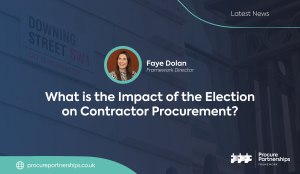Since the infamous Latham Report written over 25 years ago, customers and contractors in the construction industry have been searching for ways to improve efficiency and project outcomes. In an industry that has long been plagued by adversarial behaviour; where project programmes commonly overran and budgets would spiral out of control, the introduction of frameworks agreements provided a way to deliver the exact opposite; collaboration, partnership and value.
In this blog, with commentary from some of our framework contractors BAM, Vinci and Willmott Dixon, Faye Dolan discusses the mutual benefits a modern procurement framework can offer to both public sector organisations and contractors, compared to traditional OJEU procurement routes.
Frameworks offer a streamlined and efficient alternative to traditional OJEU procurement.
Public sector procurement has been put under immense strain in recent years. A challenging political and economic climate has meant that public sector budgets have been slashed and value for money scrutinised at every turn. Alongside this economic backdrop, the current OJEU requirements for public sector procurement are often criticised as being long-winded and wasteful; in fact, it is a common complaint that they are not entirely suited to UK construction procurement at all! Ensuring compliance with OJEU requirements is resource intensive, and this is only exasperated when the public body is procuring a high number of construction projects at any one time.
A significant advantage of a purchasing authority using a framework agreement is that they do not have to go through the full OJEU process every time the requirement arises. Going through the tender process once rather than several times will obviously reduce tendering costs and alleviate the pressure on internal resources. Frameworks also provide the option to ‘batch’ smaller schemes together to further improve procurement efficiencies and to cut waste in the process.
BAM Construction commented: “Framework procurement routes remove the need for clients to undertake independent and full OJEU process to identify and select suppliers, as the framework agreement has been established to be OJEU compliant, one major benefit for client’s is the significant reduction the time period required in running tendering exercises.”
Framework projects can be ‘called off’ by the customer when required, reducing the tender period down to as little as a few weeks in some cases. This enables public sector organisations to quickly procure time critical works, a common challenge for procurement professionals in public health and education sectors.
Public sector bodies can choose from fully accredited and approved contractors to reduce risk.
Appointing a contractor via traditional means when there is no previous relationship exposes the customer to a certain level of risk. The PQQ and tender process can help to assess competency and experience and to facilitate the necessary commercial checks, but until the relationship is functioning it is difficult to really understand a contractor’s capability. Selecting a contractor from an established procurement framework reduces this risk significantly. All framework contractors will have been carefully vetted before appointment and if they have not met the performance management criteria on pervious projects, they will not be allowed to progress onto subsequent schemes. The financial security of contractors who have completed the financial checks as part of the approval process can provide huge reassurance to public sector customers, many of whom will have been on the receiving end of the catastrophic consequences of contractor insolvency in the middle of a project.
Framework procurement offers customers a substantial level of commercial protection, whilst also allowing them to benefit from the shared learning between framework partners which consistently improves performance and ensures lessons learnt are transferred from project to project.
BAM Construction added: “The public sector can directly access pre-vetted contracting organisations, evaluated across competitive compliance, quality and commercial selection criteria. Clients are therefore able to benefit from direct access to suppliers with the capability, capacity and ability to deliver against the specific requirements of the services being procured.”
It is in the interest of both the contractor and the customers to achieve real value for money.
“One of the significant benefits of framework procurement for contractors is to support more effective business planning. We can link our target clients and sectors with a stable route to market through the framework. That stability allows us to plan our investment strategy for our teams, supply chain and the communities in which we work. Better planning and investment allied to the longer-term relationships that framework procurement offers will provide the outcomes our customers expect.” Rob Byrnes, Head of Frameworks, Building Division, Vinci Construction
Through a framework agreement contractors must also bring to the table a host of other initiatives to reduce whole life cost, such as improved buildability, reduced construction timescales and long-term sustainable building management solutions. Framework agreements significantly help to push these issues to the forefront during the planning and design process. The data gathered from framework performance measurement tools can greatly assist public sector bodies to verify that public money is being used wisely and efficiently and to demonstrate the value being achieved.
“Frameworks unlock the benefits of early contractor involvement, for buildability advice and cost certainty, which ensures projects represent best value. Frameworks also reduce the risk of purely price driven procurement, which often leads to compromises to quality of products and services, and can encourage sub-economic rates from bidders, which in these volatile times can leave customers exposed to the effects of supplier and contractor insolvencies.” Anthony Dillon, Managing Director, North, Willmott Dixon.
The transparency of framework agreements builds trust and maximises collaboration.
Within a framework agreement there are opportunities to share best practice between contractors and work towards common goals to increase the benefits for customers. Of course, the more successful the framework is, the more projects will inevitably be procured through it, so it is in the interest of the whole team to find the best solutions and to work proactively. Working collaboratively in this way leads to greater transparency between all members of the framework team, transparency builds trust, and trust facilitates the communication necessary to share information and generate efficiencies.
Working collaboratively also creates a greater positive impact on issues that are important to the public sector, such as in the areas of sustainability and social value, for example. Sustainable construction is a key issue for the public sector and one which requires significant input from the construction industry in order to achieve the challenging carbon reduction targets. By facilitating a situation where some of the leading contractors are in the same room, there is greater scope for innovation and a culture which searches for the answers to some of the leading industry questions. Similarly, when contractors pool resources and align to jointly support local causes, the impact of social value initiatives can be greatly increased. For example, if all partners commit to working together to help tackle skills shortages through the creation of training opportunities, collectively the benefit will be much greater than if they work alone.
“Willmott Dixon embraces the value that frameworks provide for our customers in terms of better collaboration and creating an environment where we and our customers deliver the best outcomes together. Frameworks provide the opportunity for continual learning and sharing of best practice, with both our customers and also other contractors; which can benefit the industry and a whole. We find our customers love this style of delivery and typically come back with more projects, which is great for a business like ours which is all about long term stability.” Anthony Dillon, Managing Director, North, Willmott Dixon
The benefits of using a construction procurement framework are extensive, but the importance of choosing a reputable and well-established framework which is fully OJEU compliant cannot be underestimated. A framework provider should exist first and foremost to support the public sector in finding ways of efficiently and diligently meeting their project requirements. To continue the conversation and learn more about how the Procure Partnerships Framework deliver on this commitment, please get in touch with our team.



